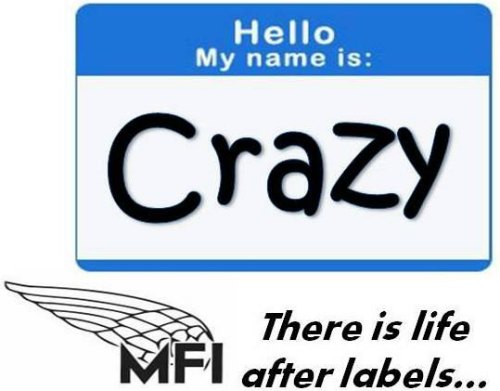November 26, 2008
I believe MindFreedom is doing remarkable work nationally and internationally to promote the protection of human rights in mental health.
In my experience, MindFreedom has been a fair, transparent interlocutor.
WHO has different views from MindFreedom in some areas, such as the definition of mental disorders or mental disability, or the assessment of the advantages and disadvantages of psychotropic medicines, but WHO also shares many common views with MindFreedom concerning the right of choice about treatment and, above all, the need of addressing the global emergency about the violation of human rights.
On several occasions, MindFreedom’s Director David Oaks has expressed the same concerns as WHO and I think it is possible to build up a fair collaboration on those issues on which we agree, more than having no collaboration based on issues on which we disagree. I think the global debate about human rights and mental health needs the contribution of people like David Oaks.
Benedetto Saraceno, MD, Director
Department of Mental Health and Substance Abuse
World Health Organization
Geneva, Switzerland
Introduction
Benedetto Saraceno was the head of the UN’s World Health Organization’s mental health department from 1999 to 2010 when he wrote the letter above in 2008 to a non profit organization called Mindfreedom International. Who is Mindfreedom International?
MindFreedom International

Unlike the UK where the government made available funding to provide free mental health counseling and therapy under a Healthy Minds Project initiated in 2008, US citizens have to fight for their Mental Health rights and its organizations like Mindfreedom that provide a voice for the people. Mindfreedom International is an alliance of 100 groups in 14 countries defending the human rights of psychiatric survivors. In the 1970’s many psychiatric survivors, and dissident mental health professionals formed MindFreedom in an attempt to change the mental health system.
In and Out of Hell
David Oaks as mentioned in the letter above was a director at Mindfreedom and a psychiatric survivor, diagnosed back in the 70’s with Schizophrenia, Bipolar, psychotic, Schizophreniform and major depression, and prescribed Thorazine, Stelazine,Mellaril, Haldol, Cogentin, Lithium and antidepressants. By all accounts, no psychotics drugs helped him out of the black pit he was in, but his involvement in social activism, self-help, peer support, survivor run groups, spirituality, meditation, diet, exercise, family and friends provided his way out. He was told by a member of the psychiatric profession that he would have to stay on drugs for the rest of his life because he was ‘genetically flawed’ and had a permanently broken brain….well Sir, thank you very much for your vote of confidence…I mean it should help…encouraging words from a scumbag psychiatrist…it’s laughable and sad. When he was institutionalized, and because he refused to take his medication, the staff dragged him into a solitary confinement cell, held him on a bare mattress, and forcibly injected the medication in his anus and then left him in the cell. Sound familiar…lunatic asylums of the 19th century..Bedlam come to mind??. Another occasion he was forced to take some neuroleptic drug and as he remembered the drug was like a “ wrecking ball to his cathedral of thoughts,feelings, and experiences that defined him at the time.”
The Hunger Strike
In 2003 David Oaks and others wrote a letter to the American Psychiatric Association (APA), the National Alliance on Mental Illness ( NAMI, another non profit grassroots organization ). and the US Office of the Surgeon General, demanding that empirically based evidence be given to the general public regarding various claims, such as major mental illness is a biologically brain based disease, and that any psychiatric drug will correct chemical imbalance in the brain. Failure to provide such evidence will force us to initiate a hunger strike. I applaud your efforts…but do you think any government body gives ( excuse my expression) a rats ass if you go on a hunger strike or not, or live or die for that matter..it is impossible for these people to provide such evidence because they simply do not have it..and they will never get it, because major mental illness is NOT a biologically brain based disease and NEITHER do psychiatric drugs correct a ‘chemical imbalance’ in the brain, they cause it.
APA Response
James Scully, medical director of the APA at the time responded by saying “ the answers to your questions are widely available in the scientific literature, and have been for years” going on to suggest they read the US Office of the Surgeon General’s 1999 Mental Health report or the APA textbook on psychiatry. Besides the only relevant statement in the report is:
‘The precise causes (etiology) of mental disorder are not known’
So on the surface you might think their requests to the APA were just folly, but..not so fast kemosabe, these people of MindFreedom were smart since they wanted to generate this exchange for the sole purpose of leaking it to the press in order to educate the public, and it worked because 2 newspapers the Washington Post and the Los Angeles Times both published articles. Isn’t it just typical..government think the public at large are dumber than cows.
Therapy Techniques

Psychotherapies include:
- Psychoanalysis
- Humanistic
- Behaviour
- Cognitive
- Group
We humans are a complex bunch, I am sure you have seen the person at the bank wicket who just wanted to take $20 out their account, which they could have easily obtained from the ATM, but no, they wanted to strike up a long conversation with the bank clerk while the queue of people began to grow agitated. Alternatively, the person who visits their local physician not they have anything wrong but they wanted somebody to talk to. The common thread in both cases could be..loneliness, or the need to interact with someone which is one of a string of reasons why people become isolated and depressed and are perfect candidates for therapy. Remember our brain is always active 24/7 even during NREM and REM sleep so we have a need to satisfy that activity, unless during sleep when the brain amuses itself by coordinating necessary repairs and relaxing the body after a long days activity. It even establishes a story book for the hosts amusement..lol..called dreaming but this is another topic to be discussed.
Psychoanalysis

The use of psychoanalysis is used to understand deep seated problems in people that have been carrying them around possibly all these lives. This type of therapy attempts to reach into the unconscious and link up with the conscious mind, which is why therapeutic sessions are intensive and very regular (typically 3-5 (45-50 minute sessions) days/week, because this regularity maintains the link to be active and not allowed to time deteriorate. Conducting such therapy conjures up the typical picture of the patient lying on a couch and therapist sitting in an easy chair, appropriately placed to minimize distraction, giving free reign for the patient to speak freely, and to mindfully extract their thoughts and feelings. These thoughts and feelings could be sourced from a childhood memory, a dream or a recent experience and express them aloud whatever comes to mind, where the therapist encourages the patient not to edit anything even the most trivial, irrelevant or shameful.
This is why the utmost comfort must exist between therapist and patient to uncover any obvious blocks in the patients flow of information which are termed resistance. This resistance to reveal their innermost thoughts and feelings is where anxiety exists and the repression of relevant and sensitive information which needs to be explored by the therapist. This exploration is the key to finding where the pieces of the psychological puzzle fits. Freud was interested in dreams since in his opinion they represented ‘latent content’, in addition Freud coined the word ‘Transference’ meaning that any positive or negative feeling that the patient may have or had toward anybody, associated with past or present is then rebounded or transfered to the therapist who will act as a ‘thought medium’. Critics of psychoanalysis argue that interpretations made by the therapist cannot be proven or disproven. Because of human emotion, transference could lead to a relationship between patient and therapist that may go beyond than that of a professional relationship, which may cloud the relationship or actually could enhance it, since the patient may feel closer to the therapist and become more open in expressing their feelings without inhibition. That is why in my opinion a good therapist has mastered the art of extrapolating relevant information from the patient and using it to channel a positive outcome.
David Halan was a British psychotherapist and in his book ‘Individual psychotherapy and the science of psychodynamics’ he talks about the concept of constructive aggression and self assertion which are productive forms of human interaction. He uses the word constructive in context with aggression because this action results in a benefit for all concerned ( a term that is used is ‘Clearing the Air’). On the other hand destructive aggression arises when an individual is incapable of identifying the true cause of their aggression unless therapy can uncover the true source.
David Halen describes an example of a young woman of 22 complaining of depressive symptoms. She displayed a personable character, always being on her best behaviour. It transpired that there was tension between her and her parents but expressed no ill will toward them. Although, what was revealed during the therapy was a hidden smouldering aggression forcefully criticising them. One weekend during a visit at her parents house there ensued a furious argument and she left soon after. The therapy of 11 sessions was terminated and 4 months later Halen received a letter from the father thanking him for helping her daughter, and that they see her most weekends now where she appears to be more relaxed and in good spirits, and coping with life better after her therapy sessions with him.
Humanistic Therapy

Carl Rogers (1902-1897) an American psychologist who was one of the founders of humanistic therapy believed in ‘Self Actualization’ meaning the fullfillment and achievement that humans strive for, or the highest level possible of ‘Human-beingness’. Each individual’s growth potential is unique, and will develop differently dependent upon one’s personality and that the individual must be in a state of congruence (harmony). He described an individual who could self actualize as a fully functioning person that possessed the following characteristics:
- Open to experience – accepting both negative and positive emotion
- Existential living – the acceptance of life’s experiences without prejudgement and preconception. Living in the now and not always looking back into the past or forward into the future.
- Trust feelings – To trust oneself to make the right choices, using our own gut reaction, feelings and instincts.
- Creativity – Be prepared to take risks, think creatively, and be able to adjust, change and seek new experiences.
- Fulfilled life – that individual who is happy and satisfied with his lot and always looking for new challenges and experiences.
The associated ‘humanistic therapy’ practised by Rogers was ‘Person Centred Therapy’ focusing on the patient’s conscious self perception rather than therapist’s interpretations. Therapists should portray genuineness, acceptance and empathy toward their patients on the understanding that their patients already possess the resources to grow. The therapeutic approach hinges on hearing an individual express what is important to them and by repeating what the patient has expressed, there occurs a sense of relief and a sense of realization on behalf of the patient by thinking that somebody is truly listening and then saying’ “Thank God somebody heard me..somebody knows whats its like to be me”. In essence the job of the therapist is to provide a ‘psychological mirror’ allowing patients to see themselves clearer. Gestalt Therapy is another type of humanistic therapy and again operates in the present and as Fritz Perls (1893-1970) a German born Psychotherapist stated “Nothing exists except in the now”. You can view these therapeutic techniques that was videoed in 1965 using a patient called Gloria and she is being interviewed by Carl Rogers and Fritz Perls. The Youtube link is below:
https://www.youtube.com/watch?v=SgiX0QLnpBM
Conclusions
It is my belief that people out there who maybe in difficult psychological predicaments would like to know what types of therapy are available that suits their needs and hopefully can find a way to help them without resorting to pharmaceuticals. We have discussed Psychoanalysis and humanistic therapy approaches, and in the next part we will explain Behavior, Cognitive and Group therapy.

Dr. Berger: Now. You can live with that. Can’t you?
Conrad: I’m so scared! I’m scared.
Dr. Berger: Feelings are scary. And sometimes they’re painful. And if you can’t feel pain, then you’re not going to feel anything else, either. You know what I’m saying?
Conrad: I think so.
Dr. Berger: You’re here, and you’re alive. And don’t tell me you don’t feel that.
Conrad: It doesn’t feel good.
Dr. Berger: It is good. Believe me.
Conrad: How do you know?
Dr. Berger: Because I’m your friend.
Dr. Berger: So you felt great. You brought home a Christmas tree and everything was hunky dory. Okay?
Conrad: You’re the doctor.
Dr. Berger: Listen, don’t take refuge in one-liners like “you’re the doctor”. Okay? Because that pisses me off.
Conrad: Okay.
Quotes from the movie ‘Ordinary people (1980)
References/Acknowledgments:
- Medication madness Book 2008 Dr Peter Breggin
- Individual psychotherapy & the science of psychodynamics Book 1995 David Malan
- What is psychoanalysis Jennifer Kunst 2014 Psychology Today
- Psychology Book 1995 David G Myers
- Carl Rogers Saul Mcleod 2014 Simple psychology
- Movie quote ‘Ordinary people’ 1980 Wikiquotes
About The Author: Eric Malouin
In terms of my heritage I am not a thoroughbred, I am half English from England and half French Canadian from Quebec. Having spent the last 10 years in Medical research I thought that it was time to share my passion for true health to anybody interested in maintaining health without using conventional medicine. Once in the distant past I lived off conventional grocery shelves until you visit the man in the white coat and then a light shines through the darkness that you had not realized you were in… I was in..the twilight zone….I cured my own problems using natural methods, although they were not a big deal since I have always exercised..jogging every morning and tennis 12 hours/week, swimming but I was eating a lot of devil food that was causing my body to become unbalanced..an easy fix..reprogrammed my taste buds and gave the food back to the devil…lol
I hope you enjoy the articles……
Regards,
Eric
Contact the Author: emalouin@gmail.com